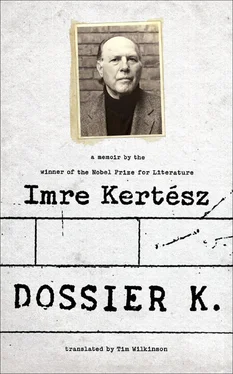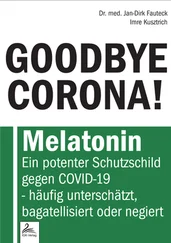That’s not inconsistent with its being fictional. Quite the opposite. In Fiasco I describe just how far I went in the interests of summoning up the past, in order to reawaken in myself the atmosphere of the camps.
You used to sniff the strap of your wristwatch …
Yes, because somehow or other the whiff of freshly tanned leather reminded me of the smell that used to build up between the barrack blocks in Auschwitz. Slivers of reality like that are, of course, very important for fiction as well. But there is still a crucial difference, in that while autobiography is a recollection of something, fiction creates a world of some kind.
To my way of thinking, remembrance is also the recreation of a portion of the world .
But without going beyond that portion of the world; yet that’s what happens in fiction. The world of fiction is a sovereign world that comes to life in the author’s head and follows the rules of art, of literature. And that is the major difference that is reflected in the form of the work, in its language and its plot. An author invents every aspect of a fiction, every detail.
But you can’t mean to say that you invented Auschwitz?
But in a certain sense that is exactly so. In the novel I did have to invent Auschwitz and bring it to life; I could not fall back on externalities, on so-called historical facts outside the novel; everything had to come into being hermetically, through the magic of the language and composition. Look at the book from that point of view. From the very first lines you can already get a feeling that you have entered a strange sovereign realm in which everything or, to be more accurate, anything can happen. As the story progresses, the sense of being abandoned increasingly takes hold of the reader; there is a growing sense of losing one’s footing …
Yes . Non habent sua fata libelli— books do not have their own fate — as György Spiró put it in his memorable 1983 essay, which as it happened was the first major assessment of Fatelessness that had been printed in Hungary since its publication in 1975. But that is getting far beside the point; we have digressed a long way from that barracks courtyard. We were at the point where the gendarmes …
Declared that they had seen us signaling by candlelight from the stables to the RAF aircraft.
You’re kidding !
Not at all; that really is what they said. At first I too took it to be some sort of joke, but then I could see they weren’t joking at all. If so much as one bomb were to be dropped near us, they would “hack us to pieces”—that was the threat, and it was clear that they could hardly wait for that bomb to be dropped. They were in a murderous mood, most of them dead drunk, like hyenas that have caught the scent of blood. It was a brilliant scene, in fact, and yet it didn’t fit into Fatelessness . It almost broke my heart to leave it out, but then there you are: that’s fiction for you. Remorseless in its laws. But then I managed to salvage the scene in Fiasco .
How can you be so … so …
Cynical?
I didn’t want to say it .
You won’t offend me. I look on my life as raw material for my novels: that’s just the way I am, and it frees me from any inhibitions.
In that case, let me ask: What did you feel that night, when you had not yet acquired enough of that … I would not say cynicism so much as irony to maintain your detachment? The irony with which, after all, you came face to face with death? Weren’t you afraid?
I probably was, but I no longer recall. What was much more important, though, was a kind of recognition that I managed to formulate many years later in Fiasco : “I grasped the simple secret of the universe that had been disclosed to me: I could be gunned down anywhere, at any time.”
A devastating realization .
Yes, and yet also not. You know, it is not so easy to dampen the joie de vivre of a fourteen-year-old boy, especially if he is surrounded by pals of the same age who are sharing his fate. There is a … an unspoiled innocence about him that protects him from a sense of being completely defenceless, completely without hope. In that sense, an adult can be broken much more quickly.
Is that perception based on your own experiences, or is it something you heard or read about later on?
It was something that I both observed for myself and also read about. Look, let’s be frank here. Among the masses of books on the same sort of subject, only a very few are truly able to genuinely put into words the unparalleled experience of being in the Nazi death camps. And it is perhaps the essays of Jean Améry that say the most, even among those exceptional authors. He has a superbly precise word: Weltvertrauen , which I would translate as “trust in the world.” Well, he writes about how hard it is to live without that trust, and once a person has lost it he is condemned to perpetual solitude among people. A person like that will never again be able to see fellow men but only ever anti-men ( Mitmenschen and Gegenmenschen are the original expressions). That trust was beaten out of Améry by the Gestapo when he was tortured in Fort Breendonk, a Belgian fort that was set up as a prison. In vain did he survive Auschwitz; decades later he carried out the sentence on himself by committing suicide.
It’s typical that those superb — terrifyingly superb — essays appeared in Hungarian translation only recently in the low-circulation publication Múlt és Jövő [Past and Future], and even that was only a modest selection from Améry’s works. But to go back to “trust in the world.”
Indeed, and I think that even at the extreme of my own most emaciated state of physical deterioration that trust … even if I was not exactly radiating it, it must have been plain to see. I simply supposed that the adult world had a duty to save me from that and get me home in one piece. That sounds rather funny today, but it really was the way I felt. I firmly believe that I have that childish trust to thank for my being rescued.
Whereas innumerable other children …
… died. Yes, it’s not easy being an exception.
Did any others survive out of the seventeen who were taken off the bus with you and later sent off to Auschwitz?
No, they all died.
Did you get any confirmation of that?
After the war was over, my mother placed an advertisement, but no one came forward. In just the same way as she put in an advertisement in the summer of 1944, when I vanished: the parents of children who vanished at the Csepel Island customs post should make themselves known.
Was it still possible for such an advertisement to appear after the Germans occupied Hungary in March 1944?
So it seems, because it did appear. But my mother took on an even odder thing than that. She upped and just as she was, yellow star on her chest, went off to the War Office — I think that’s what the Ministry of Defence was called by then.
She must have been a very plucky lady .
She was plucky, to be sure, but most of all, she had no real grasp of what was going on all around her. Her “trust in the world” remained unscathed right to the end. She was a good-looking woman, my mother; she had an elegant dress sense and would let nothing stop her. She might wear a yellow star and board “the rear platform of a tram” as the regulations required, but men would still leap to their feet and offer her a seat inside the carriage. She was proud of the fact that she bore a resemblance to Anna Töke, who was a famous actress of the time, so it sometimes happened that passers-by in the street would ask for her autograph. She was simply unwilling to face up to facts, to size up the magnitude of the risks. I just can’t imagine how she managed to get through to the office of some quite high-ranking officer — a captain or major. “But madam,” the major protested, “please! May I ask you at least to be so kind as to take the yellow star off your dress …” Needless to say, my mother demanded that her son be returned, or at the very least that she be told where he was and what had happened to him. What’s more, the major made inquiries about it straight away, and Mother was informed that her son and his companions had been taken off to Transylvania and put to work as loggers at a timber-forest there; and even if her mind was not entirely put at rest by that, right there and then Mother was willing to believe it for the time being, because that was what she wanted to believe. At the time people would hold on for dear life to such illusions as they had contrived about the world order being rational.
Читать дальше












